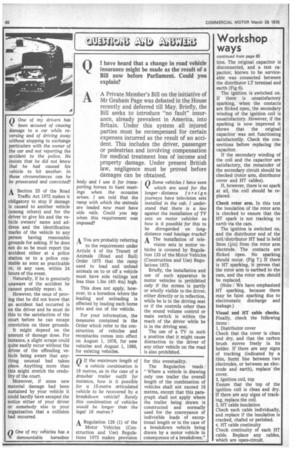Q One of my drivers has been accused of causing damage
Page 68

If you've noticed an error in this article please click here to report it so we can fix it.
to a car while reversing and of driving away without stopping to exchange particulars with the owner of the car and not reporting the accident to the police. He insists that he did not know that he had caused his vehicle to hit another. In these circumstances can he be prosecuted and convicted?
A Section 25 of the Road Traffic Act 1972 makes it obligatory to stop if damage is caused to another vehicle (among others) and for the driver to give his and the vehicle owners' name and address and the identification marks of the vehicle to any person having reasonable grounds for asking. If he does not do so he must report the accident either at a police station or to a police constable as soon as practicable or, in any case, within 24 hours of the event.
Naturally, if he is genuinely unaware of the accident he cannot possibly reporc. it.
However, the onus of proving that he did not know that an accident had occurred is on the driver and he must do this to the satisfaction of the court before he can escape conviction on these grounds.
It might depend on the amount of damage done. For instance, a slight scrape could quite easily occur without the driver of the offending vehicle being aware that anything unusual had taken place. Anything more than this might stretch the credulity of the court.
Moreover, if some new material damage had been sustained by your vehicle it could hardly have escaped the notice either of your driver or somebody else in your organisation that a collision had occurred,
















































































































